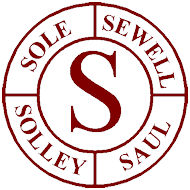A Virtual Conference
By Rosemary Bailey
This article was published in the December 2020 edition of Soul Search, the Journal of The Sole Society
With a lack of any kind of events in 2020 I was particularly keen to ‘attend’ the virtual Really Useful Family History Show put on by the Family History Federation; we emailed out details of the show to all our members. To be honest, the convenience of sitting in my own home rather than travelling somewhere appealed, although perhaps I have just got lazy with having staying at home so much. The cost was a very reasonable £5.
The conference took place one Saturday with four sessions of live talks, with choices for each session giving a total of 23 talks. Each talk was 45 minutes which was just about the right length. Talks were varied, several about DNA and family history, but also talks on research into particular groups of people like those in certain industries, research in the various home nations, even talks on digitising records for FamilySearch.
Initially the plan was for the talks to be available for 48 hours after the conference. However, some attendees had trouble logging into on the day so make up for it the talks were available for a full seven days rather than the 48 hours initially planned. A bonus for me, it meant I was able to watch more of more. I am sure if they hold the conference again this issue will be ironed out.
Personally I was able to access the site and the talks perfectly. Hurrah for technology!
I was disappointed with what was billed as their ‘knowledgeable’ exhibitors’. All I could find was a page which had buttons to click on for various family history societies which took you to another page which had a little information about, perhaps, what indexes they hold and a link to their website. I suppose I had been expecting something interactive, with the ability to talk to someone from the society. I would imagine that would have been possible technically, although it may have been complicated. However it may have been too much for the societies to have someone there all day.
My first talk was by David Cuffley about Trade and Occupation sources with particular interest in brickmaking and calico dying. By co-incidence put up a slide of a 1839 Pigot’s trade directory which showed a Joseph Sewell, cooper, of Crayford. Extraordinarily there was another relevant slide that showed an entry from the Apprenticeship booklets by the Society of Genealogists of the City Livery Companies which was of Joseph Anderson son of Joseph of North Mimms being apprenticed to Andrew Sewell, brick maker, on 18th October 1641.
My second talk was entitled My Ancestor was an Agricultural Labourer by Alan Ruston and included information about both an agricultural labourer’s life and the records available for research. Interestingly I learnt that the term Ag Lab was not in existence till the 1841 census when the government coined it so that it would fit in the box on the census form!
I very much enjoyed the talk on Alms-houses by Dr Judy Hill for the social history information although the slides weren’t great.
I also listened to some of the DNA talks which has inspired me to get mine tested as a Christmas present – watch this space!
Not all the talks were as enjoyable or useful. There were a couple that I thought would be useful for the society, including one that billed itself as being about researching groups of people who are outside a family group, including those with the same surname. However it seemed to be mostly the speaker pushing the software package he had been involved in designing to record this type of data.
There was a ‘Goody Bag’ section which consisted of various documents, although these could have been better described on the link as you had to go into each individual one to find out what it was. One of the best I thought was a booklet that a child could use to record their family history which I downloaded. Other documents in this Goody Bag section included an index to the 1811, 1821 & 1931 census for East Grinstead in Surrey which I checked for our names, a journal from the Dalton one name society, and snippets of various indexes held by county societies.
There was also a competition to win a show sweatshirt.
Obviously the virtual show lacked the usual stalls where you can buy merchandise, and talk to family history societies. However it was a wonderful opportunity to listen to up to 23 talks which wouldn’t have been possible at a live show. It also would have enabled those who would have been unable to travel to a show to attend the talks. I hope it is run again next year as I will ‘attend’ again!
